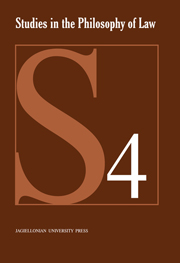Book contents
- Frontmatter
- Contents
- Preface
- Six Causes of the Dispute over Legal Bioethics
- Bioethics and Legal Philosophy
- The Outline of the Subject of Biojurisprudence
- Law and Biotechnology
- The Ethical Significance of Evolution
- Human Nature after Darwin
- The Notion of the Person in Bioethical Debates
- The Roots of Normativity. From Neuroscience to Legal Theory
- Why No One Should Ever Win the Nobel Prize: Neurolaw, Reward and Punishment
- Is There Anybody Who Really Wants to Live Forever? The Significance of Mortality
- The Slippery Slope Arguments Against the Legalization of Physician-Assisted Suicide
- Ethical Problems of Hematopoietic Stem Cells Transplantation
- Notes about the Authors
The Ethical Significance of Evolution
Published online by Cambridge University Press: 05 September 2014
- Frontmatter
- Contents
- Preface
- Six Causes of the Dispute over Legal Bioethics
- Bioethics and Legal Philosophy
- The Outline of the Subject of Biojurisprudence
- Law and Biotechnology
- The Ethical Significance of Evolution
- Human Nature after Darwin
- The Notion of the Person in Bioethical Debates
- The Roots of Normativity. From Neuroscience to Legal Theory
- Why No One Should Ever Win the Nobel Prize: Neurolaw, Reward and Punishment
- Is There Anybody Who Really Wants to Live Forever? The Significance of Mortality
- The Slippery Slope Arguments Against the Legalization of Physician-Assisted Suicide
- Ethical Problems of Hematopoietic Stem Cells Transplantation
- Notes about the Authors
Summary
Fifty years ago, Morse Peckham concluded his review of Darwin's impact on humanities with a rhetorical question: “Is it true that what Darwin said had very little impact, but that what people thought he said, that is, what they already believed and believed to have been confirmed by Darwin, had an enormous impact?” With respect to the ethical implications of the Darwinian revolution, the answer is a resounding yes. While the ideological reception of Darwin's discoveries has been dominated and biased by the ghost of social Darwinism, the genuine ethical implications of evolution have been overlooked and, to some extent, deliberately ignored in order to avoid a confrontation with the traditional, unconditional anthropocentrism, in particular in its religious rendition. 150 years after the publication of Darwin's On the Origin of Species, one of the most revealing scientific works ever, it is precisely this conflict with humans’ sense of self-importance that explains the enduring strength of irrational opposition to the acceptance of the natural, evolutionary origins of Homo sapiens, the theory of natural selection, and even the very fact of evolution. However, while the denial of evolution is generally recognized as religion's frontal attack on science and a serious threat to Western civilization, the questioning of the evolutionary origin of the human psyche or the whole of human nature seems to be tolerated even in academia, as if a supranatural intervention in the evolution of one primate were more acceptable than, for example, in the origin of life even though the theory of biogenesis still poses serious problems while that of anthropogenesis does not.
- Type
- Chapter
- Information
- Studies in the Philosophy of LawLegal Philosophy and the Challenger of Biosciences, pp. 65 - 76Publisher: Jagiellonian University PressPrint publication year: 2010



